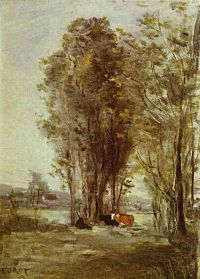
Corot
|

The first radio lecture
Tufts University, 1922
Sending and receiving
Dieter Daniels
translated by Henning Grentz
tout-fait
At the beginning, radio was promoted as an educational tool for the masses, the "University of the Air" was supposed to have more students than all universities of the country combined. At the first radio lecture at Tufts University in 1922 it looks as if Freud himself speaks into the apparatus of the soul - an anticipation of the powers of the libido which eventually destroys all mass education through this media?...(more)
_______________________
The Broome Review
A Journal of Contemporary Literature
NewPages Blog
Printed On Archival Quality Paper
Timothy Liu
Our century’s spiritual epic written in a hand
we cannot read. Impossible
to counterpoint
the apolitical dream reduced to an apple
without design
while icy cosmic chatterings
orbit the earth, filtered through the radio’s
intermittent fuzz —
history taking on shape —
a diary scrawled into by a child’s hand. ...
...(more)
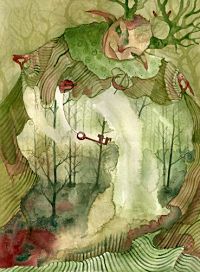
Into the woods
Laura Pelick
The Broome Art Gallery Laura Pelick
_______________________
Nietzsche, Derida and and Foucault: Re-excavating the Meaning of Archaeology
Ian Bapty
The plan of this paper is to use Nietzsche to frame a discussion of rather more recent trends in 'structuralism' and 'post-structuralism', and to do that specifically in relation to the thought of Foucault and his transition in the late 1960s/early 1970s to a position explicitly and implicitly claiming links with Nietzsche (and then, in a final skew of direction to interpose from this debate into the topic of this book -archaeology after structuralism). The point is not to conduct an analysis ultimately justifying Nietzsche against Foucault or Derrida, or vice versa, and then to impose this new 'truth' as yet another new epistemological underpinning for archaeology - which would be exactly to fall prey to the seductive wiles of what Nietzsche calls the 'will to truth' once more 'tempting us to many a venture' - instead the aim is to consider the value that binds together such opposing positions in their mutual activity and reactivity. Nietzsche's stated aim as the overall object of his philosophy was to 'attempt ... a revaluation of all values', to question the implicit belief in a necessary moral interpretation of opposites as represented, for example, in Darwinist theory -
the well being of the majority and the well being of the few are opposite views - points of value: to consider the former a priori of higher value may be left to the naivety of English biologists - All the sciences have from now on to prepare for the future tasks of the philosophers: this task understood as the solution of the problem of value.
Nietzsche
It is this spirit of enquiry this paper aims first to explain (necessarily in some detail) and then develop in relation to current debates in post-structuralism and 'post-processual' archaeology....(more)
Meta Archaeology
via Philosophy's Other: Theory On The Web
_______________________
The Elephant
Primo Levi
Translated by Martin Bennett
Literary Review, Summer, 2001
Dig deep, and you will find my bones
However absurd in this place of snow.
I had had enough of loads and roads,
And missed the grass and warmth of home.
Weapons and coins from Carthage you'll find
Buried by the avalanche. Absurd, absurd!
Just like my story, like History itself:
What to me were Rome or Carthage?
Now my ivory, our species' pride
Curved like a sickle moon, lies
Splintered amongst run-of-the-stream pebbles:
...(more)
_______________________
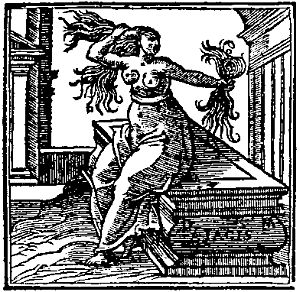
On victory born of deceit
Alciato's Book of Emblems
The Memorial Web Edition
in Latin and English
I, Virtue, soak the tomb of Ajax with my tears,
alas, wretched, having rent my whitening hair.
Certainly this matter still remained,
that by a Greek judge I should be vanquished:
and that deceit should have the stronger defence.
_______________________
Traumatizing Theory
The Cultural Politics of Affect in and Beyond Psychoanalysis
Karyn Ball
Review by Petar Jevremovic
Metapsychology Online Reviews
via Farhang Erfani _______________________
A Thought Experiment
Should Obama Escalate the War in Afghanistan?
Chuck Spinney
Barack Obama is the American Blair. That he is a smooth operator and a black man is irrelevant. He is of an enduring, rampant system whose drum majors and cheer squads never see, or want to see, the consequences of 500lb bombs dropped unerringly on mud, stone and straw houses.
Obama, The Prince of Bait and Switch
John Pilger
A total of 64 civilians were bombed to death while The Times man was discomforted. Most were guests at the wedding party. Wedding parties are a “coalition” speciality. At least four of them have been obliterated — at Mazar and in Khost, Uruzgan and Nangarhar provinces. Many of the details, including the names of victims, have been compiled by a New Hampshire professor, Marc Herold, whose Afghan Victim Memorial Project is a meticulous work of journalism that shames those who are paid to keep the record straight and report almost everything about the Afghan War through the public relations facilities of the British and American military.(....)
The scandal of this would be headline news, were it not for what George W Bush’s former spokesman Scott McClellan has called “complicit enablers” — journalists who serve as little more than official amplifiers. Having declared Afghanistan a “good war”, the complicit enablers are now anointing Barack Obama as he tours the bloodfests in Afghanistan and Iraq. What they never say is that Obama is a bomber.
Let's Speak the Truth About Afghanistan
Eric Margolis Huffington Post
The war now being waged in Afghanistan by the U.S. and NATO closely resembles 19th century colonial "pacifications" in which a puppet ruler is installed, a native mercenary army ("sepoys") hired to fight, and western troops sent to crush rebellious tribesmen who refuse to follow the diktat of the imperial power.
Equally important, the real objective of the ongoing U.S. occupation of Afghanistan became recently evident. The U.S.-installed Karzai regime in Kabul finally singed a long-discussed pipeline deal that will bring energy south from the new gas and oil Klondike of the Caspian Basin through Afghanistan to Pakistan's coast and India.
As the perceptive writer Kevin Phillips notes, U.S. and NATO forces in Afghanistan -- and Iraq -- have become "pipeline protection troops."...(more)
_______________________

Mega Churches
Joe Johnson
_______________________
Peter Culley’s The Age of Briggs & Stratton
review by John Latta
...the book’s subtitle is (Hammertown Book 2), and continues, thus, Culley’s terrific 2003 book of that name. The back cover of Hammertown pictured what seem’d a crude and corroded gear-wheel, with each of its teeth flinging off a title in a centrifugal fit: in the wheel’s center one read: “Writer and art critic Peter Culley lives in Nanaimo, on Vancouver Island.” Terribly apt design for a poem or series of poems that here, in its second “installment”—the mind behind the writing is too restless and indefatigable and curious for the word—seems suddenly and absolutely capable of most defiantly rippling out through the various juggernauts of the twentieth century’s collapse and into the present to encompass the brute history and giddy trials of a whole finicky continent, and beyond. And Culley’s range of cultural reference and keenest renegade curiosity seem clearly up for the task.(....)
The Age of Briggs and Stratton is a big book—long and with the sense of some big drafty echoey structure, a grange, a firehall—though its parts move with a lithe grace, neatly filling up and out, using the available floor showman-style. Which is to say, look how Culley cuts a figure (in “Crazy Rhythm,” out of “Pages from the Children’s Encyclopedia”):
To speed up
or slow down at will
like that
like Anita no matter
the lyric’s ‘arcs’
or who you’re playing with
or in what vehicle careering
depends on the services
over decades
of a drummer—
Roy Haynes & Sassy
would be another
example—capable of lowering
six whirring brushes
onto a linseed-darkened
dream sideboard
while defending a perogy
supper from a platoon
of gibbons—imagine
having such a pedal to press! ...(more)
Peter maintains mosses from an old manse The Age of Briggs & Stratton 12 or 20 questions: with Peter Culley
Rob Mclennan
other books by Peter
_______________________
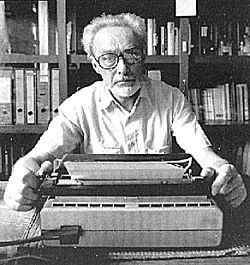
Primo Levi
July 31, 1919 – April 11, 1987
in his study, late 1986
Photo: Giansanti/Sygma
Monday
Is anything sadder than a train
That leaves when it’s supposed to,
That has only one voice,
Only one route?
There’s nothing sadder.
Except perhaps a cart horse,
Shut between two shafts
And unable even to look sideways.
Its whole life is walking.
And a man? Isn’t a man sad?
If he lives in solitude a long time,
If he believes time has run its course,
A man is a sad thing too.
Primo Levi
January 17, 1946
From Collected Poems
Testifying To His Text: Primo Levi And The Concentrationary Sublime
James T Chiampi Romanic Review, Nov 2001
Primo Levi and the language of witness
Michael Tager
Criticism, Spring, 1993
Primo Levi's Last Moments
Diego Gambetta
Memory and Mastery: Primo Levi as Writer and Witness
edited by Robera S Kremer
google books
_______________________
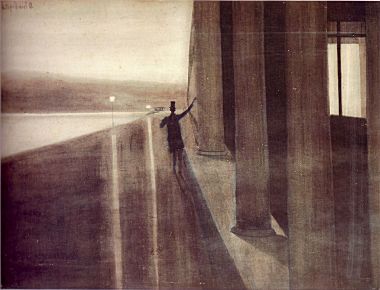
Night
1908
Léon Spilliaert
(1881 – 1946)
 photo - mw
_______________________
from Breakdown Cover
Ted Mathys
conjunctions
The Accident Reveals the Substance
The earth expressed itself in trees. A man was the expression of parents, sex, and genes. In rings, in taproots, in fork of branch and slit of leaf, the tree defied the pull of the earth, expressed itself against itself, outward in opposite directions. Out from the shadows of the forest, the man forced portions of earth to express their summer temperaments as corn and beans. To defy the authority of gravity, he then sent architecture into the sky. The tree persisted in its bald desire until contained within it was the tree-on-fire. To express the excellent velocity of his hands, rapidly the man saturated the earth with faster and faster inventions. Persisted in his desire until contained within the car was a pile-up in the river of merging traffic. Derailment latent in every train, collision and collapse in every girder and airplane. To achieve pure speed and the illusion of freedom, the man then developed television. Others tuned in to watch trees burn. The accident became the condition.
...(more)
Ash Wednesday Ted Mathys
Verse
Twelve Fundamentals
Ted Mathys
KGBBarLit
Ted Mathys in MiPOesias
Forge
Poems by Ted Mathys
coffeehouse press
and at Google Books
_______________________
The Agrarian Standard
Wendell Berry
To be an agrarian writer in such a time is an odd experience. One keeps writing essays and speeches that one would prefer not to write, that one wishes would prove unnecessary, that one hopes nobody will have any need for in twenty-five years. My life as an agrarian writer has certainly involved me in such confusions, but I have never doubted for a minute the importance of the hope I have tried to serve: the hope that we might become a healthy people in a healthy land.
We agrarians are involved in a hard, long, momentous contest, in which we are so far, and by a considerable margin, the losers. What we have undertaken to defend is the complex accomplishment of knowledge, cultural memory, skill, self-mastery, good sense, and fundamental decencythe high and indispensable artfor which we probably can find no better name than "good farming." I mean farming as defined by agrarianism as opposed to farming as defined by industrialism: farming as the proper use and care of an immeasurable gift. I believe that this contest between industrialism and agrarianism now defines the most fundamental human difference, for it divides not just two nearly opposite concepts of agriculture and land use, but also two nearly opposite ways of understanding ourselves, our fellow creatures, and our world. ...(more)
excerpt from The Essential Agrarian Reader: The Future of Culture, Community, and the Land edited by Norman Wirzba via Stan Goff
_______________________

Moving Forward, Standing Still
Rona Chang
_______________________
Refusing Theory: Avital Ronell and the Structure of Stupidity
Victor E. Taylor
Journal for Cultural and Religious Theory
4.2 (April 2003)
Refusal, especially of theory and thinking, takes on many forms, visceral, fantastic, and linguistic. The first two are easily traced as "refusal" manifests itself as "strong reaction," either in tossing or in the fantasy of tossing a theory book or colleague out of a window--the complement to Wittgenstein's "poker." The third form of refusal is much more difficult to locate since it appears or seems to appear as something not there or not understood or not gotten. These "refusals" are "performative contradictions" in speech. Not understanding or, too simply, stupidity follows in this direction insofar as it expresses itself by its incapacity to properly express itself linguistically. "Duh," "er," "um," are instances of this refusal, a refusal of meaning. But is it altogether wrong to refuse meaning? Let's examine "duh." "Duh." It is generally understood to be an extra or para-linguistic symptom of discourse's pause or failure—something akin to Aristotle's "mere voice" or an animal phone. It is not a word per se since it references the "unavailability" of discourse proper, but it is the title of a book, a website, and, now, included in an academic essay, perhaps not the first. "Duh" evokes presence through a feeling of absence, marking that which is unavailable to discourse or that which is obvious. For example, "'Duh' evokes presence through a feeling of absence, marking that which is unavailable to discourse or that which is obvious, duh (or 'no duh')." Since "duh" or even "no duh" is an extra or para-linguistic phenomenon expressing or performing an unavailability of or obviousness within discourse, it has theoretical consequences and, more precisely, consequences for the future of theory. "Duh," as a pause or failure or refusal, has been and remains the response to theory. This is easily testable by saying "différance" in a departmental meeting. The testable "duh" transforms into the detestable "duh" as the pause or failure turns to "duh" as the expression or performance of the obvious--"duh (or duuuh), that's theory," a revving up or a coming to realization of some awareness, however minimal or previously unavailable discourse. "Duh" is not all bad, however. "Duh" has a significant place in the discursive practices surrounding academic, sometimes intellectual, discourse. "Duh" is evocative, calling up, as it were, stupidity's rich tradition and within this tradition "duh" stands the ground of refusal. Refusing "duh" means resisting stupidity and its double, a "refusing duh," conjures up a break between discourse and world. This duality of "duh," the evocation of stupidity and its refusal, also elicits a response from knowing, stupidity's reciprocal and necessary condition.
"Duh" is an evocation of the obvious and an instantiation of discourse's pause or failure, but not the pause or failure of thinking....(more)
Stupidity
Avital Ronell and at Google Book
_______________________
Anne Waldman, Anselm Hollo, and the Authentic Avant-Garde
Essay by Ravi Shankar
in the newly redisigned The Quarterly Conversation
_______________________
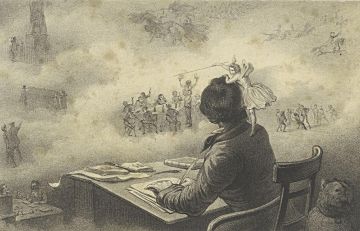
Alexander Ver Huell
(1822-1897)
Bibliodyssey
Take one part gorgeous ornamental typography and one part diabolical imagery. Combine slowly over a low heat with incidental visual curiosities. Add caprice to taste. Serve haphazardly over a bed of 19th century lithographic stones. For best effect, consume before retiring....(more)
Alexander Ver Huell at The Leiden Archives
_______________________
from the Buch der hängenden Gärten
Stefan George (1895)
Speak not always
Of the leaves
Violent breeze
Of the smashing
Of ripe quinces
Of the coming
Of destroyers
At year's end.
Of the quiver
Of the darters
In bad weather
And the lights
With the flicker
Transient.
Translation
Justin Erik Halldór Smith
Justin Erik Halldór Smith is a frequent contributor to CounterPunch and 3QuarksDaily
_______________________

Endoskeleton
Jacqueline Rush Lee
The Book Art of Robert The, Cara Barer, and Jacqueline Rush Lee
Essay by Elizabeth Wadell
quarterly conversation
Book art is intimate, fascinating, and transgressive. When we talk about books, we are usually talking about what’s inside, but there is a lot more to a book than reading it. Book art makes those other aspects its domain: the way books look; the way that, with their bent spines and marginalia, they record the history of our own reading lives; the way that these mass-produced objects can seem to hold not just letters but knowledge.
Recently, I spoke with Robert The, Cara Barer, and Jacqueline Rush Lee, three artists that use books in their art. Their approaches vary widely, but each manages to question and change the way we construe books....(more)
_______________________
Disassembling Donald Barthelme:
Flying to America’s Unfortunate Disorganization
Essay by Dan Green
quarterly conversation
I never really understood why Donald Barthelme chose to re-publish his stories in collected, compendium editions, first in Sixty Stories and then in Forty Stories. The very titles of these books obscured the playful and distinctive signposts provided by the original volumes in which these stories appeared, bearing as they did such colorful, and ultimately revealing, titles as Come Back, Dr. Caligari and Unspeakable Practices, Unnatural Acts. (Some of the later titles—City Life, Sadness—were more elegantly succinct, but they also signified a thematic association among the included stories that is lost, and to some degree impoverishes the reader’s response, when the stories are reprinted in an omnibus form.) More importantly, what encountering Barthelme’s fiction in these collected volumes, the latest of which, Flying to America, includes all of the stories not found in the first two, really threatens to de-emphasize—or even eliminate—is the more carefully calibrated iconoclasm, the redoubled assault on convention, that one experiences when reading Barthelme’s stories in their original book-bound form....(more)
_______________________
A Shock to the Collective Psyche
Bad News and Bank Runs
Mike Whitney
The daily barrage of bad news is really starting to get on people's nerves; it's obvious everywhere you look. Most of the TV chatterboxes have already cut-out the cheery stock market predictions and no one is praising the "impressive powers of the free market" any more. They know things are bad, real bad. That's why the business news is no longer presented like a happy-go-lucky Bollywood extravaganza with undulating females and exotic music. Now it's more like B-grade slasher movie where everyone winds up dead at the end of the show.
_______________________

Usurer, curate and merchant
Lübeck's Dance of Death
Text and Photos
Martin Hagstrøm
The Dance of Death
_______________________
White House Predicts Bush Will Leave $482 Billion Deficit
The White House predicted Monday that President Bush would leave a record $482 billion deficit to his successor, a sobering turnabout in the nation’s fiscal condition from 2001, when Mr. Bush took office after three consecutive years of budget surpluses.
The worst may be yet to come. The deficit announced by Jim Nussle, the White House budget director, does not reflect the full cost of military operations in Iraq and Afghanistan, the potential $50 billion cost of another economic stimulus package, or the possibility of steeper losses in tax revenues if individual income or corporate profits decline. ...(more)
_______________________
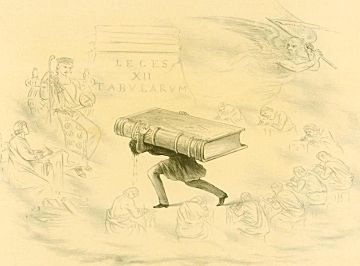 Alexander Ver Huell
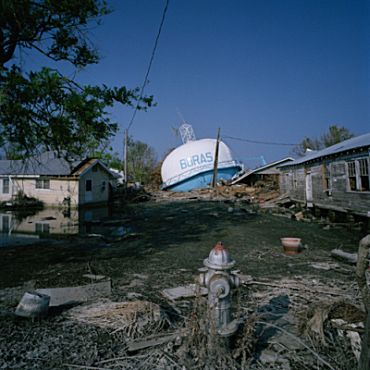
Water Tower and Fire Hydrant
Buras, Louisiana
Aric Mayer Studios Balance + Disorder
Aric Mayer Studios
Notes from a life of pictures
Aric Mayer's blog
.....................................................
Aesthetics of Catastrophe
Aric Mayer
Public Culture
My objective was (and continues to be) not only to present the images of the storm's aftermath, but to critique our reception and expectations of them as well.
A key issue in the interaction between visual culture and the practice of democracy is the ways and the means by which our popular aesthetic forms frame, address, and resolve the expectations of the audience. It is a highly political exchange. The dynamics of this interaction, both its promises and its problems, is made vividly explicit in large-scale events that move the entire country into action or opinion. Hurricane Katrina is one of the most significant events of this kind in recent memory. By examining aesthetic positions available and deployed in depicting that catastrophe, we can see how the aesthetic positions themselves can at times work in opposition to the content of the work. (....)
Photographs are always made for an intended audience of some kind, either real or imagined. Going into New Orleans, I carried with me the knowledge that I was entering someone else's city and that I had a responsibility to do something there that might be of value long after the immediate crisis had stabilized. My goal was to create a large body of photographs that crossed the city, carrying the viewer directly into this apocalyptic landscape. Only here, instead of explosions and fire, the more usual metaphors of destruction, this was an apocalypse of water, which is a very different thing. Throughout Western history, water has been a symbol of the unconscious, of the indwelling unrecognized forces and agencies that operate beneath the surface of our conscious lives. This is a fitting metaphor, for we are still untangling and discovering the unseen political and social influences that contributed to the disaster....(more)
.....................................................
Photography and the Unconscious Panopticon: Part One
Aric Mayer
Wenders' film (Until the End of the World) was first released in 1991, before the widespread explosion of the internet, but the core critique of images and their addictive properties seems even more relevant today. If images can liberate us, they are just as capable of trapping us in unconscious processes and systems of rewards and penalties beyond our conscious awareness.
Photography and the Unconscious Panopticon: Part TwoAric Mayer comments on David Levi Strauss' Click here to disappear: thoughts on images and democracy
_______________________
Notes on Love and Photography
Eduardo Cadava and Paola Cortes-Rocca
pdf download
What Barthes engages here, in an extremely systematic and rigorous manner, is nothing less than what produces the difficulty of all contemporary reflections on photography: the absence of the subject. But, as he suggests—and here lies his strength and courage—this absence does not result from disappearance or effacement, but, on the contrary, from multiplication and proliferation. As he puts it,in front of the lens, I am at the same time: the one I think I am, the one I want others to think I am, the one the photographer thinks I am, and the one he makes use of to exhibit his art. In other words, a strange action: I do not stop imitating myself, and because of this, each time I am (or let myself be) photographed, I invariably suffer from a sensation of inauthenticity, sometimes of imposture (comparable to certain nightmares). Photography—and the portrait as its genre par excellence—constitutes a radical and absolute destabilization of the Cartesian subject, “comparable to certain nightmares,” and not unlike the one advanced by psychoanalysis, in which “I think where I am not, therefore I am where I do not think.”4 Like psychoanalysis, photography shatters the subject of reason—a subject that would be complete and coincidental with itself—by introducing a plurality that is not produced by the metonymic force of unconscious desire, but by affects and the gaze: “I see, I feel, hence I notice, I observe, and I think” . It tells me that I do not exist before my image—that I exist only as an image, or, more precisely, only as a series of images, none of which are ever one. It redeems me from the immobility of a “self” and tells me that the I that is reproduced in each new image, and in every copy of each of these images, is never even one at the moment in which it poses before the camera. “I only resemble,” Barthes notes, “other photographs of myself, and this to infinity: no one is ever anything but the copy of a copy, real or mental” . Undoing every contemplative act that would presume a distance between “itself” and the image on which it focuses, Camera Lucida puts the category of an observer—as the neutral subject of a process that presumably occurs outside him—into crisis. _______________________

Self-portrait in a Convex Mirror
Parmigianino
c. 1523/24
.....................................................
from
Self-Portrait in a Convex Mirror
John Ashbery
The soul establishes itself.
But how far can it swim out through the eyes
And still return safely to its nest? The surface
Of the mirror being convex, the distance increases
Significantly; that is, enough to make the point
That the soul is a captive, treated humanely, kept
In suspension, unable to advance much farther
Than your look as it intercepts the picture.
Pope Clement and his court were "stupefied"
By it, according to Vasari, and promised a commission
That never materialized. The soul has to stay where it is,
Even though restless, hearing raindrops at the pane,
The sighing of autumn leaves thrashed by the wind,
Longing to be free, outside, but it must stay
Posing in this place. It must move
As little as possible. This is what the portrait says.
But there is in that gaze a combination
Of tenderness, amusement and regret, so powerful
In its restraint that one cannot look for long.
The secret is too plain. The pity of it smarts,
Makes hot tears spurt: that the soul is not a soul,
Has no secret, is small, and it fits
Its hollow perfectly: its room, our moment of attention.
That is the tune but there are no words.
(...)
And just as there are no words for the surface, that is,
No words to say what it really is, that it is not
Superficial but a visible core, then there is
No way out of the problem of pathos vs. experience.
You will stay on, restive, serene in
Your gesture which is neither embrace nor warning
But which holds something of both in pure
Affirmation that doesn't affirm anything.
...(more)
_______________________
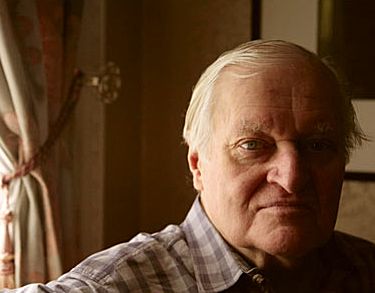
John Ashbery
(b. July 28, 1927)
Photo: Nathaniel Brooks for The New York Times John Ashbery feature
Jacket 2 — January 1998 John Ashbery in conversation with John Tranter
1985
Ashbery on PennSound The word made image
collaboration of John Ashbery and painter Jane Hammond
Judith E. Stein
Art in America, May, 1995
_______________________
The Intellectual Construction of "Social Distance":
Toward a Recovery of Georg Simmel’s Social Geometry
Philip J. Ethington
cybergeo - european journal of geometry
If wandering, considered as a state of detachment from every given point in space, is the conceptual opposite of attachment to any point, then the sociological form of the ‘stranger’ presents the synthesis, as it were, of both these properties. (This is another indication that spatial relations not only are determining conditions of relationships among men, but are also symbolic of those relationships.)
Georg Simmel, "The Stranger" (1908)
The relationship between geometric and metaphoric distance should be among the most urgent of research questions in late-twentieth century human sciences. This essay is an attempt to contribute to the ongoing and increasingly rich discourse on space in social theory, by tracing the life course of a critical concept as it has been constructed intellectually and deployed empirically. That social distance needs to be refashioned is a major conclusion of this essay, but precisely how it must be refashioned is a question that I think we are only beginning to see. Not only Georg Simmel among the founders of social theory will be necessary for this reconstruction. Emile Durkheim’s concept of "social morphology," for example, contains important insights into the relationship between geometric and metaphoric meanings of distance (Durkheim 1992). This essay, however, maintains a focus on Simmel, Park, and Bogardus as shapers of the contemporary notion of "social distance."(....)
Simmel had the brilliance to capture in a single social type, “the stranger” the basic elements of social distance. Metaphoric distance is strangeness: the “unfamiliar” (and we must take note of the etymologies here: familiar and unfamiliar are metaphoric of blood kinship). But geometric distance is the structure of everyday life in space-time that permits or promotes the formation of familiarity: ie, the stranger literally was not here when we developed our familiarity. Reciprocally, “structures of feeling” (Williams 1973) produce “structures of practice” (Bourdieu 1980), and vice-versa. A powerful exploitation of recent sociospatial theory needs to accommodate directly both of these senses of distance....(more)
_______________________
Georg Simmel at the Lectern : [PDF]
The Lecture as Embodiment of Text
Janet Stewart
Body & Society
Despite the obvious importance of the lecture form to Simmel, in the study of `classical sociology', the original mode of presentation of his texts has been largely ignored. However, eye-witness reports of Simmel's lectures suggest the folly in such neglect. For example, Emil Ludwig has argued that the essential difference between Simmel's lectures and his written work lies in the relative accessibility of his lectures compared to the density of his texts. Indeed, he suggests that `the diffi- culty of his [Simmel's] style of writing . . . is resolved when the speaker resolves the sentence'. While Ludwig focuses on the new perspective gained by the vocalization of the text, Paul Fechter describes the role that the physical presence of the body played in articulating Simmel's ideas:. . . one watched while the figure on the lecture platform became the medium of an intellectual process, the passion of which was not only realized in words, but also in gestures, movements, actions. When Simmel wanted to reveal to his audience the heart of a thought, an idea, he didn't just formulate it: to an extent, he raised it visibly with his hand. His fingers stretched outwards and upwards and then closed again, his whole body turned under the force of his uplifted hand, in which the problem rested. Curiosity having been aroused by these descriptions of Simmel's lecturing style, this article examines the dissemination of Simmel's sociological thought through the medium of the lecture, focusing on the production, reproduction and reception of sociological ideas, and foregrounding the physical presence of the body as an essential element of the lecture, distinguishing it from written forms. _______________________

Malcolm Lowry
July 28, 1909 - June 26, 1957
photo by John Springer
_______________________
Some Trees
John Ashbery
These are amazing: each
Joining a neighbor, as though speech
Were a still performance.
Arranging by chance
To meet as far this morning
From the world as agreeing
With it, you and I
Are suddenly what the trees try
To tell us we are:
That their merely being there
Means something; that soon
We may touch, love, explain.
And glad not to have invented
Some comeliness, we are surrounded:
A silence already filled with noises,
A canvas on which emerges
A chorus of smiles, a winter morning.
Place in a puzzling light, and moving,
Our days put on such reticence
These accents seem their own defense.
_______________________

Within & Beyond the Wall
Dietrich Oltmanns
_______________________
Grand Abacus
John Ashbery
Perhaps this valley too leads into the head of long-ago days.
What, if not its commercial and etiolated visage, could break through the
meadow wires?
It placed a chair in the meadow and then went far away.
People come to visit in summer, they do not think about the head.
Soldiers come down to see the head. The stick hides from them.
The heavens say, "Here I am, boys and girls!"
The stick tries to hide in the noise. The leaves, happy, drift over the dusty
meadow.
"I'd like to see it," someone said about the head, which has stopped
pretending to be a town.
Look! A ghastly change has come over it. The ears fall off - they are
laughing people.
The skin is perhaps children, they say, "We children," and are vague near the
sea. The eyes-
Wait! What large raindrops! The eyes-
Wait, can't you see them pattering, in the meadow, like a dog?
The eyes are all glorious! And now the river comes to sweep away the last of
us.
Who knew it, at the beginning of the day?
It is best to travel like a comet, with the others, though one does not see
them.
How far that bridle flashed! "Hurry up, children!" The birds fly back, they
say, "We were lying,
We do not want to fly away." But it is already too late. The children have
vanished.
Three Poems From Some Trees
John Ashbery with catalan translation at the barcelona review

The clock master
ENCLOSURES / NY05
Photographs of Manhattan
Irwin Klein
1964-69
_______________________
Terrorism, Crowds and Power, and the Dogs of War
Lesley Brill
“There is nothing that man fears more than the touch of the unknown.” So begins Crowds and Power, Elias Canetti’s monumental meditation on human nature. What might Canetti have to tell us in the U.S. about our situation post-elections 2000 and 2002, and post-September 2001? At a time of increasing mass movements world-wide and of intense religious and cultural antagonisms, his insights into the human condition offer an illuminating perspective on the apparent political motivations of the current U.S. administration and their potential outcomes. A Nobel Prize winner who grew up between the World Wars in Austria, Switzerland, and Germany and was forced to flee Vienna when the Nazis came in 1938, Canetti spent much of his life thinking about the great catastrophes of his century. His assumption—who can doubt it?—was that “There is no other hope for the survival of mankind than knowing enough about the people it is made up of.” His experience, research, and reflection led him to conclude that a foundation block of the human psyche rests on our impulse to come together into crowds and to extend them through time. A universal fear motivates that impulse: the terror of an unknown touch that threatens predatory seizing, tearing, dismembering, and incorporation.(....)
Crowds and Power distills Canetti’s ruminations on his dangerous, beloved species into a dense series of interlocking essays. It offers few prescriptions, but contains much to help us comprehend ourselves and our often obscure motives. Concrete in all his writing and resolutely independent, Canetti helps us to understand our time, when mass movements swell and threaten to clash horrifically and when national leaders are able to accrue unprecedented concentrations of power. As our President declares that the world is divided into two simple categories, those who oppose terrorism and those who support it, and as his Administration pushes for gargantuan military budgets and authoritarian powers, many people feel not more but less secure. Canetti’s persuasive analyses of crowds and power offer compelling arguments in support of the doubts many harbor toward the current U.S. Administration’s response to terrorist attacks and its tactics in the face of continuing threats.
Terrorism awakens the inborn human horror of mysterious, malign contact. It can strike anywhere, in the guise of anyone. Terrorists are the ideal “unknown,” an incomprehensible Other—at once sub- and superhumanly relentless. Like evil itself, they cannot be understood, only labeled. They cannot be persuaded to quit their wickedness, but must be compelled to do so … or killed. They are the ultimate justification for ever more extravagant military spending, because there can be no end to their threat nor any fully adequate defense against it....(more)
_______________________
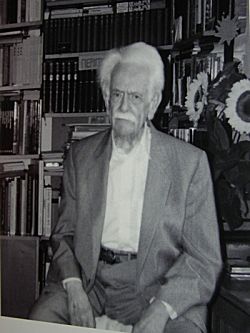
Elias Canetti
July 25, 1905 - August 13, 1994
The End of Modernism
Elias Canetti's Auto-da-Fé
William Collins Donahue
University of North Carolina Press
Canetti's novel never fails to elicit rather strong opinions. Recently in the New Yorker, David Denby declared it "a long, provocatively odd, and emotionally demanding novel." Remarkable amidst the variety of these distinctly unambivalent reactions is the fact that readers have tended to see Auto-da-Fé as a compellingly contemporary work, and in one notable case, even pronounced it a "postwar novel." This is an understandable error. Canetti did not really gain wide recognition until the early 1960s, when his quixotic anthropological study Crowds and Power first appeared. Implicitly addressing the Cold War stalemate, and hailed as "above ideology," this much-discussed book was bound to encourage readers to associate Canetti in the first instance with the burning issues of that bipolar world, rather than with prewar modernist fiction. Yet placing Canetti the novelist alongside the likes of such unmistakably postwar writers as Grass, Böll, and Christa Wolf was probably more than an oversight. Those who read and reviewed the novel at this time, including those who certainly knew of its Weimar-era origins (such as Hans Magnus Enzensberger), were in fact quite prepared to view it as a work chiefly about contemporary society. It may be that "social relevance" was already becoming a dominant criterion of literary achievement, even before the student movement established it more firmly. And it may also be that some critics simply mistook the date of republication—it was reissued in the wake of Crowds and Power in order, in part, to capitalize on that book's success—for the original date. Whatever the case, nobody seemed to miss the modernist context of the early 1930s, when Canetti actually wrote what would be his only published novel. (....)
One of the things that makes Canetti so continually attractive is that he represents an ideal to which so many of us still, if only covertly, aspire-namely, that of the nonspecialist polymath. There may be no more memorable a skewering of academic overspecialization and pomposity in all of world literature than that which we find in Auto-da-Fé. Yet this is clearly not to be read as an anti-intellectual stance. On the contrary, Canetti steadfastly maintained that it is possible to be a serious intellectual generalist without necessarily devolving into a dilettante. The effort, at least, is necessary, Canetti felt, lest in our drive to master detail we lose sight of the larger social good. And those who are preoccupied with their own narrow specialty become vulnerable, as the novel unforgettably suggests, to the power grabs of the less scrupulous. Though Auto-da-Fé mercilessly critiques acquisitive bourgeois notions of German "cultivation" (Bildung), Canetti himself redeems-and refashions-the concept in his own literary-intellectual career. It is my hope, therefore, to enrich the reading experience of the more general reader, even as I engage my colleagues in fairly specific debates about the novel's complex relationship to the interwar period of Austrian and German culture, traditional literary modernism, and Canetti's own considerable body of social thought....(more)
_______________________
"Memory believes before knowing remembers"
Faulkner, Canetti and Survival
Jeffrey J Folks
Papers on Language and Literature, Summer 2003
_______________________
Nighthawk Postcards (From Easy Street)
Tom Waits
there's a blur drizzle down the plateglass
as a neon swizzle stick stirrin up the sultry night air
and a yellow biscuit of a buttery cue ball moon
rollin' maverick across an obsidian sky
as the busses go groanin' and wheezin',
down on the corner I'm freezin';
on a restless boulevard at a midnight road
I'm across town from EASY STREET
...(more)
_______________________
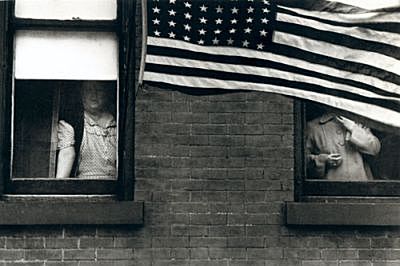
Parade
Hoboken, New Jersey
Robert Frank
_______________________
As I’ve said, I did not always think of my life as a prison in which all actions are determined according to a random pattern thrown down by an unkown and insensate authority. Indeed, when I was young I saw myself as a masterbuilder who would one day assemble a marvellous edifice around myself, a kind of grand pavilion, airy and light, which would contain me utterly and yet wherein I would be free. Look, they would say, distinguishing this eminence from afar, look how sound it is, how solid: it’s him all right, yes, no doubt about it, the man himself. Meantime, however, unhoused, I felt at once exposed and invisible. how shall I describe it, this sense of myself as something without weight, without moorings, a floating phantom? Other people seemed to have a density, a thereness, which I lacked. Among them, these big, carefree creatures, I was like a child among adults. I watched them, wide-eyed, wondering at their calm assurance in the face of a baffling and preposterous world.
- John Banville, The Book of Evidence
via Steve Himmer
_______________________
One should never read a single book at a time. In the act of reading multiple texts, aleatory encounters between texts are produced like sparks arcing across two separated wires. There is no method here. Where in when such a spark will leap is not subject to calculation or prediction. Rather, such sparks are purely a product of chance. And, of course, it is necessary to add the caveat that it is impossible to read a single book at a time. As Freud famously observed in his allegory of the Roman city, and Bergson in his cone of memory, the past co-exists with the present, such that any act of reading is necessarily saturated with all the previous texts one has encountered. Yet even here the points at which texts touch one another, the point at which virtual texts and actual text touch in singularities, is entirely aleatory and without calculation. Perhaps there must be an Idea, Problem, or Multiplicity at work in Deleuze’s sense of the word– a problematic field –that presides over the genesis of such relations. The principles of auto-synthesis are murky.
- Larval Subjects .
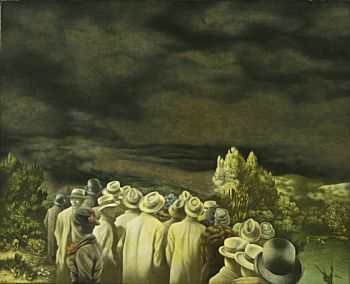
Expectation
Richard Oelze
1935-36
1930s: The Making of "The New Man"
National Gallery of Canada
On view until September 7, 2008
...brings together more than 200 paintings, sculptures, drawings and photographs by artists from Germany, Russia, Italy, Spain, France, Mexico, the United States and Canada.
This international exhibition features works from eminent European Artists such as Salvador Dalí, Pablo Picasso, Wassily Kandinsky, Max Ernst, and August Sander, and North American artists including Grant Wood, Jackson Pollock, Walker Evans and Alex Colville. Also showcased are works by Joan Miró, Diego Rivera, Alexander Rodchenko, Otto Dix, Lisette Model, Andrè Kertész, and Jean Arp.
_______________________
Economic Realities Are Killing Our Era of Fantasy Politics
Matt Taibbi
Here's the thing: nobody needs me or Bernie Sanders to tell them that it sucks out there and that times are tougher economically in this country than perhaps they've been for quite a long time. We've all seen the stats -- median income has declined by almost $2,500 over the past seven years, we have a zero personal savings rate in America for the first time since the Great Depression, and 5 million people have slipped below the poverty level since the beginning of the decade. And stats aside, most everyone out there knows what the deal is. If you're reading this and you had to drive to work today or pay a credit card bill in the last few weeks you know better than I do for sure how fucked up things have gotten. I hear talk from people out on the campaign trail about mortgages and bankruptcies and bill collectors that are enough to make your ass clench with 100 percent pure panic.
None of this is a secret. Here, however, is something that is a secret: that this is a class issue that is being intentionally downplayed by a political/media consensus bent on selling the public a version of reality where class resentments, or class distinctions even, do not exist. Our "national debate" is always a thing where we do not talk about things like haves and have-nots, rich and poor, employers versus employees. But we increasingly live in a society where all the political action is happening on one side of the line separating all those groups, to the detriment of the people on the other side.
(....)
Our economic reality is as brutal as it is for a simple reason: whether we like it or not, we are in the midst of revolutionary economic changes. In the kind of breathtakingly ironic development that only real life can imagine, the collapse of the Soviet Union has allowed global capitalism to get into the political unfreedom business, turning China and the various impoverished dictatorships and semi-dictatorships of the third world into the sweatshop of the earth. This development has cut the balls out of American civil society by forcing the export abroad of our manufacturing economy, leaving us with a service/managerial economy that simply cannot support the vast, healthy middle class our government used to work very hard to both foster and protect. The Democratic party that was once the impetus behind much of these changes, that argued so eloquently in the New Deal era that our society would be richer and more powerful overall if the spoils were split up enough to create a strong base of middle class consumers -- that party panicked in the years since Nixon and elected to pay for its continued relevance with corporate money. As a result the entire debate between the two major political parties in our country has devolved into an argument over just how quickly to dismantle the few remaining benefits of American middle-class existence -- immediately, if you ask the Republicans, and only slightly less than immediately, if you ask the Democrats....(more)
_______________________
Let Them Eat Free Markets
How deregulation fuels the global food crisis
David Moberg
_______________________
America's Cyborg Warriors
Antifascist
Bloodied by "facts on the ground" in Iraq and Afghanistan however, and despite imperialism's much-vaunted technological superiority, America's techno-warriors continue searching for "Holy Grail" solutions to the political quandary they have confronted since the Vietnam war: how to achieve "victory" in environments that have proven themselves deadly quagmires, humiliating object lessons never learned by the world's sole "hyperpower"?(....)
... DARPA projects seek to enhance U.S. capabilities for dominating "target" cities. But let's not kid ourselves, cities are viewed by corporate grifters who reap the rewards in "outsourced" multibillion dollar contracts and the securocrats who deploy these systems, as no more than killing fields and occupation zones. What does this say about a predatory system that regard human beings as so much expendable waste to be targeted, tracked and when expedient, killed by machines controlled by other human beings thousands of miles away?
America's techno-warriors and their corporatist masters most certainly plan to field such systems in the "homeland" itself. Viewed as exemplary means to control "restless natives" in the imperialist metropolis, surveillance technologies replete with biometric "smart cards," highly politicized terrorist "watch lists," sensor and tracking equipment are the "speartip" of a technical-scientific counterrevolution, neoliberal globalization's "dark side."
Deployed in U.S. and European cities along with the other accoutrements of an emerging police state--data mining, internet and cell phone surveillance--in the final analysis, these systems represent not the strength, but rather the precarious nature of capitalism's entire geopolitical project. However, that doesn't make them any less deadly--or dangerous--to a functioning democracy....(more)
_______________________
Manifesto in Black
Dark Wraith
The UnCapitalist Journal
Take a long, hard look at a killed Iraqi child. Tell yourself that this is not your doing. Soothe yourself. Tell yourself you are not responsible; it's someone else's doing. It's an insurgent; it's a bad American airstrike; it's George W. Bush. It's someone else who did it, not you. Then, once you feel all better, be sure to vote for the candidate who will tell you what you want to hear: we need to leave Iraq, or we need to stay there. It's all the same: seeds from the fruit of a poison tree of lies that will, themselves, bear lies tailored to your need for self-exoneration.
This is how the valence of Hegelian historical inevitability gets assigned, and the folly of self-deception cannot long be held at bay, certainly not this time, because the same force that makes corrupt any choice we now select in our dealings in the Middle East will one day become tangibly manifest in the fire and shrapnel of embittered terrorists who will unmercifully punish us just as we unmercifully butchered their ancestors and kin.
Neither John McCain nor Barack Obama can mitigate the inevitable: lies beget consequences, and those consequences are not only the superficial catastrophes of far away places we can keep at bay by hiding in our homeland....(more)
_______________________

Richard Oelze
Self-Portrait with girlfriend
1922/23
.....................................................
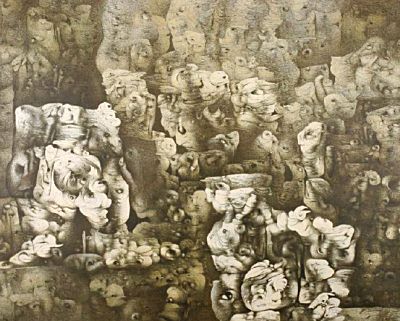
Wald
Richard Oelze
1963-64
Richard Oelze Paintings & Drawings from the 1950s & 1960s
Catalogue
Ubu Gallery
an exhibition of more than 40 works by a one-time Bauhaus student whose early contact with the works of Dalí, Ernst and Magritte made him one of the few German artists with direct contacts to and affinities with the Paris Surrealists.
_______________________
Confidence Comes Easy
Marge Piercy
Some things are naturally
vigorous. They encroach,
they ooze confidence. Some
beings act entitled. Wisteria
climbs all over every shrub
and tree it can reach.
It smothers. Yet I welcome
its twilight shade on a hot
tar afternoon to hide me
from the lava sun under
its arbor. The kitten arrived
yesterday at one p.m.
...(more)
anderbo magazinevia NewPages Blog
_______________________
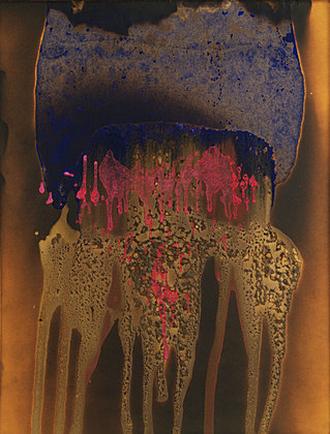
Minneapolis Fire
Irwin Klein
_______________________
Nighthawk Postcards (From Easy Street)
Tom Waits
there's a blur drizzle down the plateglass
as a neon swizzle stick stirrin up the sultry night air
and a yellow biscuit of a buttery cue ball moon
rollin' maverick across an obsidian sky
as the busses go groanin' and wheezin',
down on the corner I'm freezin';
on a restless boulevard at a midnight road
I'm across town from EASY STREET
...(more)

Jade Belt Bridge
Summer Palace
1924-1927
Sidney D. Gamble Photographs
Duke Digital Collections viaAndrew Abb
_______________________
In a terrific interview (c. 1983) in Gargoyle, Jaimy Gordon discloses Keith Waldrop’s impeccably taut definition—“A novel is that literary form into which you throw everything that’s captured your attention in the last five years”—and delineates a fine crosshatching (amounting venerably to a “mount,” an implacable hillock, an uppity rearing steed of a place, good for seeing) of English idiosyncratic rhetors (Francis Bacon to George Meredith by way of Richard Burton, Sir Thomas Browne, and other such renegade “writerly” types—none’d cop to speech as a viaduct for the sentence, or the way it burrows in all twisty and athletickal and brute, like a mole, to follow the grand excursionary force of the mind it is out doing the “scouting” for, unsure of its end . . .) It’s a sublime and intelligent romp, the interview, puts a genial cuffing to the critical boosterism of “deceptively simple style,” that kind of pathetic glomming (by editors and readers alike) to the systematically dull under the faux assurances of “clarity.”
John Latta
Providence Baroque:
Here Comes Jaimy Gordon
An Interview gargoyle
... trade publishers are resistant to certain qualities of prose: the dense, the opaquely inward, the flamboyantly learned. Either the editors are unable to read these themselves, or they can't believe their clientele will read them, and they advance statistics, some highly suspect, to prove it. Of course an independent-minded or powerful literary editor will from time to time see such a book to publication, and in fact the literary establishment traditionally keeps a small kennel of difficult prose stylists behind, or rather in front of, its main house, piously praised though unread. (How long the conglomerates will continue to keep up genteel appearances in this fashion is another question.)
Trade publishing, overall, to borrow a trope from William O'Rourke, reacts to the complete spectrum of prose style no better than a dog's eye to the color spectrum. They see only the middle range, which has sufficient clarity or, more correctly, openness about it. Openness means access: they are concerned with how many readers will troop into the clearing. ...(more)
Gargoyle
_______________________
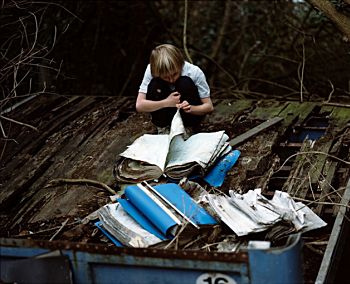
Nothing That Happens After We Are Twelve Matters Very Much
Andrew Burton Seesaw Magazine
via The Exposure Project
Andrew Burton Photography
_______________________
The more you read, the fewer are the traces left by what you have read: the mind becomes like a tablet crossed over and over with writing. There is no time for ruminating, and in no other way can you assimilate what you have read. If you read on and on without setting your own thoughts to work, what you have read can not strike root, and is generally lost. It is, in fact, just the same with mental as with bodily food: hardly the fifth part of what one takes is assimilated. The rest passes off in evaporation, respiration and the like.
-
Schopenhauer on Reading
_______________________
“an intellectual justification of unhappiness – the greatest that has ever been attempted”
- Beckett on Schopenhauer
Schopenhauer's Recommendations To Beckett
Gottfried Büttner
Abstract:
As a young man, Beckett read Schopenhauer again and again, and not only because of his beautiful style, despite his claims to the contrary. Schopenhauer's pessimism was very close to Beckett's own, and he was to heed the three ways of enduring the misery of existence that Schopenhauer recommended: art, or aesthetic contemplation, compassion, and resignation. This essay explores the ways in which Schopenhauer's thought made it possible for Beckett to create his literary work and to come to grips with his own life. via ReadySteadyBlog
_______________________

Barbershop Through Screen Door
Robert Frank
1955

Edward Hopper
(July 22, 1882 – May 15, 1967)
_______________________
19 books on French Philosophy
Fark Yaralari = Scars of Différance
The Image in French Philosophy
Temenuga Trifonova
download link The discourse of the ‘materiality’ of language and thought is part of a broader trend in twentieth-century philosophy and aesthetics: the attempt to resurrect matter from a long period of oblivion and disparagement and raise it on a pedestal as the only thing that can ‘save’ us from a totalizing and telegraphable reality. As we shall see, this ‘recuperation’ of material reality demands that philosophy do away with the distinction between mind and matter, subject and object, by attributing the characteristics of one to the other i.e. by relativizing differences in kind are reducing them to differences in degree.(....)
In true Bergsonian fashion, the philosophy of the impersonal posits a mysterious, invisible force (similar to a Platonic Form) ‘behind’ the image and asserts that the image does not even express this force but that we think it does only because of certain entrenched linguistic conventions (such as the linguistic habit of attributing an object to all intentional verbs). It draws attention away from the image as a representation and instead emphasizes its being. This, in turn, has important implications for the way in which we think of how images affect us or how we relate to them. By foregrounding the being of the image, this kind of thinking suggests—rather pessimistically—that the main way (or perhaps the only way) we can ‘link’ to an image (to use Lyotard’s vocabulary) in a world supersaturated with representations is if the image appeals to our own sense of being rather than to our aesthetic sense.
Even if the original intention of the five thinkers discussed here was to challenge the universal categories of Cartesian philosophy, it seems to me they ended up coming full circle restoring the idea of the universality and impersonality of consciousness they tried to subvert. _______________________
The Dialect of the Tribe
Harry Mathews
electronic book review
For Georges Perec(....)
The longer I live - the longer I write - the stronger becomes my conviction that translation is the paradigm, the exemplar of all writing. To put it another way: it is translation that demonstrates most vividly the yearning for transformation that underlies every act involving speech, that supremely human gift. Of course I am not saying that translation - at least not as I practice it - takes precedence over other modes of writing. On the contrary: it is its modesty that makes it so useful. But while it differs enormously in substance from true writing (like your own), the difference is only one of degree. One might then say that insofar as true writing is a kind of translation, the text from which it works is an infinitely arduous one: nothing less than the universe itself....(more)
writing under constraintarchived thread at the electronic book review Oulipo feature at Drunken Boat
_______________________

Rooms for Tourists
Edward Hopper
1945
_______________________
Black Painting Divided by a White Painting
Paul Hoover
jacket
In our decade, the romantic tide is out, and the constructivist, materialist, and formalist tides are in. One would rather find and assemble than mine or dredge up. Originality in the old sense of a “soul-making” activity is replaced by invention, constraint, and gamesmanship. We are not at play in the fields of the lord, but the static, self-interrupting planes of the internet. In Heidegger’s terminology of facticity overwhelming poesis, this is a bad thing. It means there are no shadows at play in the Lichtung, or clearing. (The Rilkean formula might be: Achtung + Lichtung = Dichtung.) In Constructivism, everything is unconcealed, in the open, and obvious. We can see this difference more clearly, perhaps, if we limit our attention to the black on black and white on white paintings of Malevich and Rodchenko. Both were intent on a new society’s new art by way of mathematics and surface. Malevich: “I have transformed myself in the zero of form” (Lavrentiev 15); Rodchenko: “Art is one of the branches of mathematics” (Lavrentiev 15). But almost immediately there was a bifurcation. Malevich was more interested in the finished work of art, a geometry that is inscribed by style, aesthetics, and, according to Alexander Lavrentiev, the “emblematic identification of black with iconic power and white with eternity” (15). What’s the sum of a black painting divided by a white painting?
Like the New York School and language poets, I’m interested in the varieties of meaning made possible by Oulipo and proceduralism, especially through their playfulness. John Ashbery is our major poet; his work is an extraordinary balance of gravity and levity, artifice and sincerity; sobriety and play....(more)
Paul Hoover's Poetry Blog
.....................................................
Belief and Poetry
Paul Hoover
Story needs such
heat freaked with
murder plans. Overheard
at home: I’m
in the death
house now, story’s
cousin chained to
truth and sleeping,
linking method and
comprehension in the
syntax of love
letters ever more
remote. This is
called fiction in
mother’s night garden
wet with sun.
...(more)Paul Hoover - Three Poems
Jacket 1, October 1997
_______________________
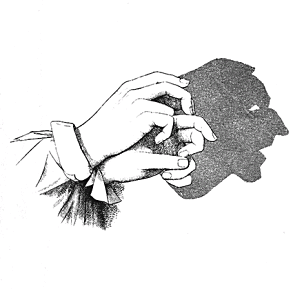 fear
Hand Shadows
To Be Thrown Upon The Wall
Henry Bursill
1859
_______________________
Kritike Volume Two Number One (June 2008)
The War on Concepts: The Thought of Jan Patocka and the War on Terror [PDF]
Katy Scrogin If we can effectively dismiss one bloc as the undifferentiated “enemy,” there is no reason to consider its various griefs, aspirations, or concerns, for the manner in which it has been defined does not allow for such human possibilities. Rather, this group represents only fear, terror, evil, and danger to freedom— and as such, is deserving only of elimination. It is easy, therefore, to justify, for instance, torturing individual members of the enemy bloc. To arrange the structure of the situation in this way, then, there is no room or reason for the administration to pause in its fervency and to consider what the United States as a nation may be doing to heighten the opposition’s hostility— for the bearers of absolute freedom, in the rigid manner in which they have been defined, are incapable of any act of evil. In its rigid dichotomy of good and evil, the administration can avoid contemplation of its possible complicity in arousing resentment against itself; it can dodge consideration of the fact that other, more preferred forms of freedom may exist alongside the American brand of democracy, and that there are other cultures who may have no desire to be incorporated into its grand capitalist adventure.
via Pro-logus
_______________________
Philosophy in a Time of Terror:
Dialogues with Habermas and Derrida
pdf download
_______________________
Bush's Banned Interview: An Insight Into Insanity
Ben Cohen
The interview took place almost four years ago, but is the perfect illustration of a man elected purely on name recognition, dirty money, and no discernible talent. Four years ago, there were still enough Americans who believed Bush's infantile bluster was charming and direct. Now, even Republicans do not waste their time with him, quietly wishing he would disappear and stop embarrassing their party.
The interview with Coleman should go down on record as definitive proof of Bush's utter incompetence, a priceless picture of a madman who had no business occupying the highest office of the land.
Watch
_______________________

Rooms by the Sea
Edward Hopper
1951
_______________________
Hum
Ann Lauterbach
The days are beautiful
The days are beautiful.
I know what days are.
The other is weather.
I know what weather is.
The days are beautiful.
Things are incidental.
Someone is weeping.
I weep for the incidental.
The days are beautiful.
Where is tomorrow?
Everyone will weep.
Tomorrow was yesterday.
The days are beautiful.
Tomorrow was yesterday.
Today is weather.
The sound of the weather
Is everyone weeping.
Everyone is incidental.
Everyone weeps.
The tears of today
Will put out tomorrow.
The rain is ashes.
The days are beautiful.
The rain falls down.
The sound is falling.
The sky is a cloud.
The days are beautiful.
The sky is dust.
The weather is yesterday.
The weather is yesterday.
The sound is weeping.
What is this dust?
The weather is nothing.
The days are beautiful.
The towers are yesterday.
The towers are incidental.
What are these ashes?
Here is the hate
That does not travel.
Here is the robe
That smells of the night
Here are the words
Retired to their books
Here are the stones
Loosed from their settings
Here is the bridge
Over the water
Here is the place
Where the sun came up
Here is a season
Dry in the fireplace.
Here are the ashes.
The days are beautiful.
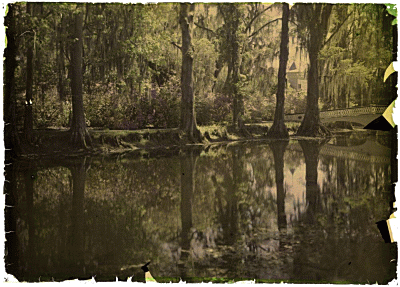
Mrs. Benjamin F. Russell
ca. 1910
George Eastman House on Flickr
_______________________
Ideas of Space
Norman Lock
conjunctions
I had lived always among the trees; and when, at last, I came out onto the Plain, my head reeled and I was sick. The uninterrupted light was, in its novelty, nearly fatal—a plague of nettles, a yellow noise, a magisterial voice deaf to all human entreaty. I mean to say that I had not, until that moment, seen the sun whole and undivided. Always, it had hidden behind a screen of foliage or, in winter, bones of twig and fescue. The light was thin and strained. A dusk even at midday. To see it, all at once and of a sudden, was a blow to the senses—not just to my eyes, though they stung and the light turned black within them, but to the other organs of sense through which the world invades and trammels up the mind. I was like one struck down by it, as Saul had been on his way to Damascus. I smelled light like a rust or mold, tasted its bitterness, and felt it against my skin—hot and barbed.
Brought to my knees, I wished I had not left the thickset woods to savor distances. ...(more)
_______________________
The Other River
Terry Glavin
Dooney's Cafe
There is the river we know, and there is also another river.
This is something I came to understand when I was a boy, growing up among the sawmills and net lofts along the Lower Fraser River, and under the bridges and in the backstreets of Burnaby, which lies in the middle of Greater Vancouver, on Canada's west coast. It's something I've been thinking about quite a bit lately. (....)
The world is a palimpsest, and as soon as a story is told to make sense of things, it is a rare thing for it to vanish out of the world entirely. Once you hear these stories, you will never see the river we know in quite the same way, nor the cosmopolis that has grown up along its banks, and those stories will echo in everything you hear for as long as you may live....(more)
_______________________
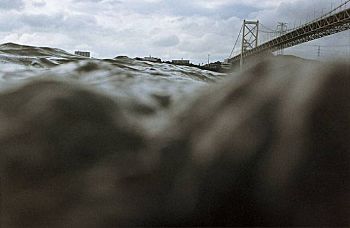 half awake and half asleep in the water
Asako Narahashi
_______________________
Dead Magazines
Adrian Martin
Filmkrant
Richard Wilson, a close associate of Orson Welles throughout the 1930s and '40s, tells a terrible tale of neglect: the entire, priceless archives of the Mercury Theater (from scripts to props) were kept in storage... until, finally, there was no one to pay the bill any longer on the storage facility. One wonders: how many such cultural archives - of avant-garde groups, arts organizations, publishing houses, film companies - have vanished, been dispersed or junked, precisely because, a few years down the track, there was no 'guardian' left who was willing to pay the storage bill for the sake of posterity?(....)
...we must recognise the spectre of mortality which looms over Internet magazines - not to mention even more ephemeral sites such as blogs and 'listserv' discussions. How many of us print out the entire contents of the film pages we read on-line? One day, that may be the only trace left of them...
On the other hand, the Internet gives us the spectacle of something that is just as ghostly but nonetheless gratifying: magazines that have reached their final issue, perhaps years ago, but still remain on-line, thanks to the good graces of whoever pays the archive bill....(more)via Girish Shambu
_______________________
The Industrious "Industrial Book"
Patricia Crain reviews A History of the Book in America: Volume 3: The Industrial Book, 1840-1880.
common-place
As its loose frame indicates, this volume is a collection of essays providing specialists' syntheses of broad areas of inquiry, rather than an overarching narrative. Organized thematically, around such matters as manufacturing and labor, trade and government, serial publication, ideologies and practices of reading, and cultures of print, and moving, generally, from economic and institutional history to cultural history, each of the eleven chapters (many divided into mini-essays by various authors and all supplemented by rich bibliographic essays) is charged with covering the whole period. The most elegant essays—among them, Meredith McGill's on copyright, Bruce Laurie's on labor, David Henkin's on urban print, Louise Stevenson's on books in the home, Susan Williams's on authorship—offer a panoramic history in and around the period and zoom in on representative events. Henkin, for example, contrasts the Philadelphia the friendless young Benjamin Franklin famously encountered with Horace Greeley's New York a century later, which welcomed that ambitious youth with a riot of raucous and abundant signage. Like these wordy urban streets, the capacious "book" takes in a wide range of cultural forms and locations, from the African American Amos Webber's diary, kept from 1854 to 1903, to the professionalization of learned culture through journals, research universities, and scholarly societies, to the circulation of religious tracts in staggering numbers during the same period....(more)
_______________________
The Radical Critique of Liberalism: In Memory of a Vision
Toula Nicolacopoulos
re-press
_______________________
Reentry
Reversing mass imprisonment
Bruce Western
The failure of the great experiment in mass incarceration is rooted in three fallacies of the tough-on-crime perspective. First, there is the fallacy of us and them. For tough-on-crime advocates, the innocent majority is victimized by a class of predatory criminals, and the prison works to separate us from them. The truth is that the criminals live among us as our young fathers, brothers, and sons.(....)
Second, there is the fallacy of personal defect. Tough-on-crime politics disdains the criminology of root causes and traces crime not to poverty and unemployment but to the moral failures of individuals. Refusing to resist temptation or defer gratification, the offender lacks empathy and affect, lacks human connection, and is thus less human than the rest of us. The diagnosis of defective character points to immutable criminality, stoking cynicism for rehabilitative efforts and justifying the mission of semi-permanent incapacitation.(....)
The final fallacy of the tough-on-crime perspective is the myth of the free market. (....)
Getting tough on crime created a sustained public policy mistake of immense proportions. If the prison boom was indeed produced by a historic collision between the jobless ghetto and a punitive politics of civil rights backlash, retreating from mass incarceration will involve equally fundamental shifts in politics and economics. What would a new politics of criminal justice look like, and what policies would it promote?...(more)
_______________________
Crime and punishment in the neoliberal twilight
Lenin's Tomb
Create an illicit capitalist economy in the hands of extra-legal cartels embroiled in competition with one another, with that competition delegated down to those lowest in the hierarchy, and you get a great deal of violence in the process. I strongly suspect that states which impose drug laws are well aware of this, and that their function is to facilitate a strongly interventionist police force with ready-made pretexts for detaining and imprisoning people considered dysfunctional to the society's requirements. It keeps 'problem' populations, generally the urban poor, under tight surveillance. It criminalises them before they have necessarily even broken the law.
If talking tough and ratcheting up repression, with heavily policed schools and widely used stop-and-search applied in a racist fashion, worked, then American cities would be the safest in the world....(more)
_______________________

Benoît Vollmer
via Mrs. Deane
_______________________
Notes on the Capitalist Persuasion
John Haines
I.
“Everything is connected to everything . . .”
So runs the executive saw,
cutting both ways
on the theme of all improvement:
Your string is my string
when I pull it my way.
In my detachment is your dependency.
In your small and backward nation
some minor wealth still beckons –
was it lumber, gas, or only sugar?
Thus by its imperial logic,
with carefully aimed negotiation,
my increase is your poverty.
When the mortgage payments falter,
then in fair market exchange
your account is my account,
your savings become my bonus,
your home my house to sell.
In my approval is your dispossession.
II.
Often in distress all social bonds
are broken. Your wife may then
be my wife, your children
my dependents – if I want them.
So, too, our intellectual custom:
Your ideas are my ideas
when I choose to take them.
Your book is my book,
your title mine to steal,
your poem mine to publish.
In my acclaim is your remaindering.
Suppose I sit in an oval office:
the public polls are sliding,
and to prove I am still in command
I begin a distant war. Then,
in obedience to reciprocal fate,
by which everything is connected,
my war is your war,
my adventure your misfortune.
As when the dead come home,
and we are still connected,
my truce is your surrender,
my triumph your despair.
John Haines - Nine Political Poems
Archipelago

Carnival
circa 1934
László Moholy-Nagy
July 20, 1895 – November 24, 1946 _______________________
The nature of the mind is un-born.
Why should it be necessary to know this?
The "Hsin-Ming" or "Song of Mind"
Niutou Fajung
translated by Henrik H. Sorensen Leaves from the Buddha's Groveassembled by Anders Honoré
_______________________
homo sominex
Limited, Inc.
http://limitedinc.blogspot.com/2008/07/homo-sominex.html
That the Nazis were studying sleepers in 1944 seems to surprise Martin, but those of us who’ve read Gravity’s Rainbow realize that WWII was more than a war, it was the world we come from, it was the egg opening, it was the hatching of our common psychotic global humanity, a synergy of endorphins. Our erections were wagging as the bombs were dropping. So of course, humans were guinea pigged on all levels, for all purposes, because this is how control happens, honey. Now, let me strap you back into your cot...
However, I am starting up this subject to link to the review of a book, Insomniac, by Gayle Greene that I received and didn’t review. I feel guilty about that. But when I told my editor I wanted to review two books on sleep problems, he looked at me as if I were nuts. And when I told him Sleepers Civil Rights were the next big next big thing (I get carried away, I foam at the mouth, I start sounding like Maldoror off his meds!), he changed the topic. I obviously had briefly lost that contact with reality. The synaptic distance had lengthened.
Well, the sleepless are truly in a different world from the slugabeds, the ones without the wired brain tap tap tapping Nevermore at the vital center somewhere back there in the brain....(more)
_______________________
Critique of Violence
Walter Benjamin
1921
translated by Edmund Jephcott
download pdf
...in the exercise of violence over life and death, more than in any other legal act, the law reaffirms itself. But in this very violence something rotten in the law is revealed, above all to a finer sensibility, because the latter knows itself to be infinitely remote from conditions in which fate might imperiously have shown itself in such a sentence. Reason must, however, attempt to approach such conditions all the more resolutely, if it is to bring to a conclusion its critique of both lawmaking and law-preserving violence.
In a far more unnatural combination than in the death penalty, in a kind of spectral mixture, these two forms of violence are present in another institution of the modern state: The police. ....
Long Sunday Symposion on Walter Benjamin's "Critique of Violence".
_______________________
The Adventures of the Parasite Army
Why Afghanistan is Not the Good War
Ron Jacobs
It's the perennial thorn in the colonialist's side. It's the war that won't go away. It's a wasp sting that swells, slowly choking the life out of the sting's recipient. It is the nearly seven-year old occupation of Afghanistan by the United States and various NATO allies. Nearly forgotten by most Americans, the situation in that country has taken headlines away from the occupation of Iraq because of the resurgence of the anti-occupation forces. (....)
...the imperial forces arrayed against the Afghani resistance are like a predator insect that sets up a parasitic home on the host and then attempts to take over the host. There are those wasps that fight the invading parasite and there are those who merely exist within their nest. The US and NATO occupiers are the parasites hoping to install their host--represented in the person of Unocal president Karzai--on the people of Afghanistan. At this point the parasites have failed to achieve their goal. Because of this failure, the parasite army is planning to intensify their assault.
This is where we leave the analogy and ask why Washington thinks it can achieve what the British and the Soviets could not? The Afghanistan region has always been the piece of the puzzle known as the Great Game that refuses to fit into the proscribed plans of any colonial power. ...(more)
_______________________

nil scrap value: silvertown
A photo-essay by IT and Owen
infinite thØught This was once the Tate Institute, a social centre built for workers in the Tate & Lyle complex: an example of how the sugar magnate pioneered the use of culture as a means of social control (see also: the Tate Gallery he founded several miles upriver at Pimlico). It's unclear what exactly the symbols on the second floor refer to. Rumours that the institute will be redesigned by Herzog and De Mueron as a daring brick and razorwire structure to be called 'Tate Silvertown' have proved to be unfounded.
_______________________
Free verse
Charles Bernstein reviews Alan Filreis' Counter-Revolution of the Word:The Conservative Attack on Modern Poetry, 1945–1960
The Boston Review
While it may be tempting to mock the anti-modernist claims documented in Counter-Revolution of the Word, Filreis’s sober approach acknowledges the social cost for many poets. Ludicrous attacks on formal innovation become ominous when they cost someone a job or erase significant poets from cultural memory. But beyond the prices paid by individual poets, demonizing aesthetic invention and poetic difference has broader ramifications, from the diminished intellectual fare served up daily by the mediocracy to the stunted—and stunting—conception of literature promoted in too many classrooms.
Those who do not want to repeat poetic history in farcical form are condemned to study it. Counter-Revolution of the Word does just that....(more)
_______________________

Bexhill Seaside Pavillion
László Moholy-Nagy
1936
_______________________
The Poem Politic X: A Note for Future Historians
Keith Wilson
from Midwatch, 1972
When writing of us, state
as your first premise
THEY VALUED WAR MORE THAN ANYTHING
You will never understand us
otherwise, say that we
cherished war
over peace and comfort
over feeding the poor
over our own health
over love, even the act of it
over religion, all of them, except
perhaps certain forms of Buddhism
that we never failed to pass bills of war
through our legislatures, using the pressures
of imminent invasion or disaster (potential)
abroad as absolution for not spending moneys
on projects which might make us happy or even
save us from clear and evident crises at home
(....)
Be aware that
Destiny has caught us up, our choices made
subtly over the ages have spun a web about us:
It is unlikely we will escape, having geared
everything in our societies toward war and combat.
It is probably too late for us to survive
in anything like our present form.
THEY VALUED WAR MORE THAN ANYTHING
If you build us monuments let them all
say that, as warning, as a poison label
on a bottle, that you may not ever
repeat our follies, feel our grief.
...(more)
Keith Wilson, Again
Bobby Byrd

The frail, painful shadow of lyricism
Invisible Notes
Peter Ciccariello
_______________________
Placements I: "The New Wilderness"
Clayton Eshleman
Anguish, a door, Le Portel, the body bent over jagged rock,
in ooze, crawling in darkness to trace the button of itself
--or to unbutton the obscure cage in which a person and an
animal are copulas--or are they delynxing each other? Or
are they already subject and predicate in the amniotic cave
air watching each other across the word barrier, the flesh?
(....)
The beginning of the construction of the underworld takes
place in Upper Paleolithic caves. To identify this "place
under construction," I use the later Greek word "Hades,"
and it is there that the first evidence of psyche we can
relate to occurs. To be in the cave is to be inside an an-
imal--a womb--but to draw there is to seek another kind of
birth; an adjustment to the crisis of the animal separat-
ing out of the human--or, the Fall. To be inside, to be
hidden, to be in Hades--where the human hides in the animal.
...(more)
Everwhat, poems by Clayton Eshlemanreviewed by John Olson
Everwhat is a flip-flop of the word ‘whatever.’ ‘Giorgio Agamben focused my attention on the word ‘whatever,’’ writes Eshleman in the note section in the back of this collection, ‘in the opening essay in his The Coming Community. (University of Minnesota Press, 1993).’ Agamben’s use of the word ‘whatever’ is itself a reversal; he inverts the popular meaning of ‘whatever’ as a token of indifference — ‘it does not matter which’ — to its opposite: ‘being such that it always matters.’
Taken in this sense, nothing (no thing) ‘is neither a universal nor an individual included in a series,’ but rather a singularity that is fully itself — a whatever individual, a whatever singularity, a whatever being — expressing properties that are both universal (intelligible) and ineffable (its being such as it is, however experienced). In other words, ‘whatever being has an original relation to desire.’ The desire to realize its potential, to evolve toward a fullness of being that precludes being trapped in a single category, but includes the totality of its possibilities. That this rather dizzying upheavel of class and distinction should token the work of a poet like Eshleman, who has had a lifelong interest in the mythical underworld, marks a singlular step into a region of nebulous polarities....(more)
Seeds Of Narrative In Upper Paleolithic ImageryClayton Eshleman ubu
At The Locks Of The Void: Co-Translating Aime Césaire
Clayton Eshleman
Reading Translations of César Vallejo's Poems
Clayton Eshleman
Jacket Interview
Clayton Eshleman, Paul Hoover and Maxine Chernoff interview each other about their longstanding literary magazines .....................................................
Wind from all Compass Points
Clayton Eshleman
TYPO 10
Ever since I discovered the poetry of César Vallejo in the late 1950s, I have intuited that poetry is at a very early stage in its potential unfolding. The depth of "I" has only been superficially explored. Ego consciousness is inadequate to write innovative poetry. Rather than the Freudian hierarchical model, a kind of totem pole consisting of super-ego, ego, and unconscious, I would propose the antiphonal swing of the bicameral mind which in a contemporary way relates to shamanism, the most archaic mental travel. While the idea of poetry as a spiral flow, with simultaneous interpenetrations of what we call perception, intuition, feeling, and imagination, is too demanding for most writers, I think it may be one key in enabling a poet to write a poetry that is responsible for all of his experience.
_______________________

Orpheus Leading Eurydice from the Underworld
1861
Jean-Baptiste-Camille Corot
July 17, 1796 – February 22, 1875
_______________________
Thomas Jefferson and the Evolution of a Populist Vision of Intellectual Property Rights and Democratic Values
Jeffrey H. Matsuura
archipelago
_______________________
No-fee OA Journals in the Humanities
Three Case Studies: A Presentation by Open Humanities Press
Sigi Jottkandt
Abstract
Open Humanities Press (OHP) is the first open access publisher devoted to contemporary critical theory. OHP was created as a grassroots movement of academics, librarians, journal editors and technology specialists to address the growing inequality of readers' access to critical materials necessary for our research.
In this presentation, I offer case studies of journals edited by the founders of the new OA academic journal consortium, Open Humanities Press, as a starting point for a discussion of how professional open access publishing may be achieved without author-side fees (a ‘business model’ that for both practical and cultural reasons is inappropriate in the context of humanities publishing). While reputable open access publishing in the humanities confronts significant challenges, the problem of how to finance it - the problem that is frequently raised as the Gold road's chief obstacle in the sciences - appears far and away the least pressing.
Open access for critical and cultural theory: Open Humanities Press
Sigi Jöttkandt
Open Students _______________________
Cosmos and History : The Journal of Natural and Social Philosophy
Academic Journals Database Academic Journals Database is a universal index of periodical literature covering basic research from all fields of knowledge, and is particularly strong in the humanities and the social sciences. Academic Journals Database contains complete bibliographic citations, precise indexing, and informative abstracts for papers from a wide range of periodicals.
Full-text from most of the articles is available.
An essential reference tool for serious research in diverse subject areas, Academic Journals Database opens doors to a wealth of specialized information.
_______________________
In Memory of the Natural World
Charles Wright
Four ducks on the pond tonight, the fifth one MIA.
A fly, a smaller than normal fly,
Is mapping his way through sun-strikes across my window.
Behind him, as though at attention,
the pine trees hold their breaths.
The fly’s real, the trees are real,
And the ducks.
But the glass is artificial, and it’s on fire.
Charles Wright, Six Poems
latest issue of the Paris Review
_______________________

Artscape Nordland
_______________________
"Police are, essentially, bureaucrats with weapons"
Beyond Power/Knowledge [PDF]
an exploration of the relation of power, ignorance and stupidity
David Graeber
This essay is not, however, primarily about bureaucracy—or even about the reasons for its neglect in anthropology and related disciplines. It is really about violence. What I would like to argue is that situations created by violence—particularly structural violence, by which I mean forms of pervasive social inequality that are ultimately backed up by the threat of physical harm—invariably tend to create the kinds of willful blindness we normally associate with bureaucratic procedures. To put it crudely: it is not so much that bureaucratic procedures are inherently stupid, or even that they tend to produce behavior that they themselves define as stupid, but rather, that are invariably ways of managing social situations that are already stupid because they are founded on structural violence. I think this approach allows potential insights into matters that are, in fact, both interesting and important: for instance, the actual relationship between those forms of simplification typical of social theory, and those typical of administrative procedures.(....)
...in contemporary industrialized democracies, the legitimate administration of violence is turned over to what is euphemistically referred to as “law enforcement”—particularly, to police officers, whose real role, as police sociologists have repeatedly demonstrated, has much less to do with enforcing criminal law than with the scientific application of physical force to aid in the resolution of administrative problems. Police are, essentially, bureaucrats with weapons. At the same time, they have, significantly, over the last fifty years or so become the almost obsessive objects of imaginative identification in popular culture. It has come to the point that it’s not at all unusual for a citizen in a contemporary industrialized democracy to spend several hours a day reading books, watching movies, or viewing TV shows that invite them to look at the world from a police point of view, and to vicariously participate in their exploits. If nothing else, all this throws an odd wrinkle in Weber’s dire prophecies about the iron cage: as it turns out, faceless bureaucracies do seem inclined to throw up charismatic heroes of a sort, in the form of an endless assortment of mythic detectives, spies, and police officers—all, significantly, figures whose job is to operate precisely where the bureaucratic structures for ordering information encounter, and appeal to, genuine physical violence.
Even more striking, it seems to me, are the implications for the status of theory itself. via Jasper Bernes
_______________________
"our long national nightmare of peace and prosperity is finally over."
State of the Onion
Paul Krugman We're now in year 8 of the Onion Era: the era in which Onion articles have consistently proved more accurate than the stuff you read in mainstream newspapers.
_______________________
The Differend (Phrases in Dispute)
Jean Lyotard
translated by Georges Van Den Abbeele
pdf download
You are informed that human beings endowed with language were placed in a siluation such thai none of them is now able to tell aboul it. Most of them disappeared then, and the survivors rarely speak about it. When they do speak aboul it, their testimony bears only upon a minute part of this situation. How can you know that the situation itself existed? That it is not the fruit of your informant's imagination? Either the situation did not exist as such. Or else il did exist, in which case your informant's testimony is false, either because he or she should have disappeared, or else because he or she should remain silent, or else because, if he or she does speak, he or she can bear witness only to the particular experience he had, it remaining to be established whether this experience was a componenl of the situation in question. _______________________
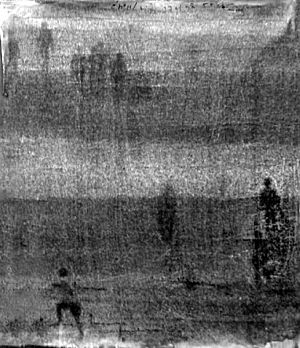
Migrations
Virgil Brill
_______________________
Life Is a Novel
Fritz Glockner
Translated from the Spanish by Elizabeth Polli
words without borders
It’s a bitch to talk to you about those ghosts you discovered. Without really wanting to, you realized you had a past that you didn’t know about. Finding that document in the book in the bedroom probably wasn’t the best way to face a story that we hid for so long (the dates, the events, the people, the photographs of an unfamiliar place, they didn’t seem to have anything to do with you).It wasn’t the best way to discover the truth in those yellowed newspapers, either. And besides, how would you know what awaited you in the archives? Maybe there, my dear Irving, you found impersonal stories that made you anxious. It was your collective past, the emotions of your family that inhabited every note.
At long last you found the father you never knew, the one you never had except for the strange, fleeting references. You remembered only endless hallways with people everywhere; you were four years old and it shocked you that we put you in front of a strange man, a man who lived in that dark building. We all waited anxiously for your answer, your reaction....(more)
_______________________

The Rabbits' Christmas Party - The Arrival
Beatrix Potter Rarities
Bibliodyssey
_______________________
“Though we keep company with cats and dogs”:
Onomatopoeia, Glossolalia and Happiness in the work of Lyn Hejinian and Giorgio Agamben
William Watkin
Jacket 36
|











































